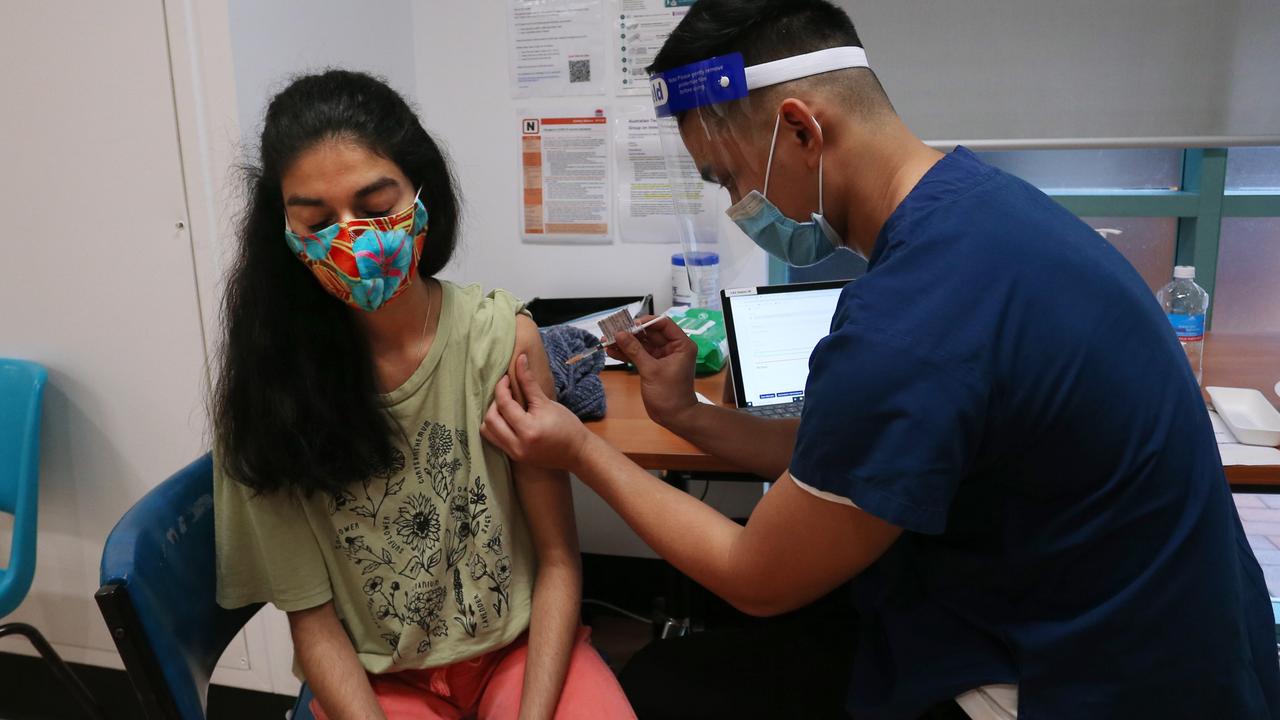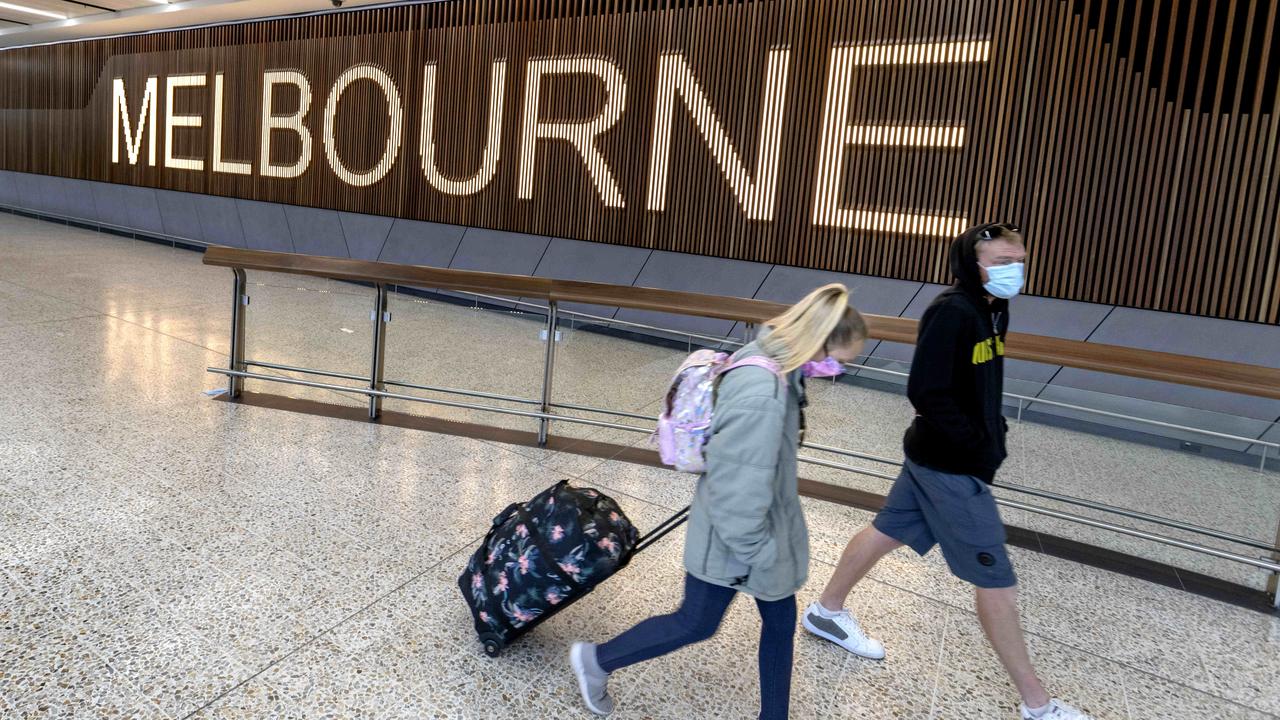Survey reveals why Australians are not getting vaccinated
Australians need to get vaccinated for life to return to normal, but a new survey shows why many are not getting it despite being eligible.
A new survey has revealed the factors that are holding people back from getting vaccinated.
New figures in the Australian Bureau of Statistics’ Household Impacts of COVID-19 Survey provide insight into why some people are not getting vaccinated even if they are eligible to do so.
Among those surveyed between June 11-20, about 33 per cent of those aged 18 years and over said they’d already had at least one dose of a vaccine.
Among those who were vaccinated, 75 per cent did not list any factors that impacted their ability to get the jab. About 8 per cent said the waiting time was too long.
But among those who weren’t vaccinated, 45 per cent nominated at least one or more factors that had impacted or would impact their ability to get vaccinated.
Vaccinating against Covid-19 is the only way for Australians to get their normal lives back, but as a nation we’re struggling.
News.com.au’s Our Best Shot campaign answers your questions about the Covid-19 vaccine roll out.
It’s fair to say the vaccine rollout has confused Australians. We’ll cut through the spin and give you clear information so you can make an informed decision.
RELATED: Seven words that end all lockdowns
About 15 per cent of those not yet vaccinated said they wanted a different jab to what was available to them, pointing to a significant proportion of people who may be avoiding the AstraZeneca jab and waiting for Pfizer instead.
The AstraZeneca vaccine is currently available to all Australians but is only recommended for those over 60 years old. Those aged 40 to 59 years old are eligible for Pfizer but those younger than 40 don’t yet have access to it and can only get AZ provided they understand the risks around blood clots.
Waiting times also seem to be a deterrent, with 11 per cent saying it took too long to get an appointment, while 7 per cent said clinic waiting times were too long.
About 7 per cent said opening hours were inconvenient.
However, 55 per cent said none of the factors listed made any difference to them getting vaccinated.
Of those who were not vaccinated, 48 per cent were eligible for the jab but had not yet got it.
RELATED: Should younger people get the AZ vaccine?
About 55 per cent said they preferred to receive their vaccination from a general practitioner (GP) while 19 per cent preferred a walk-in vaccination hub or clinic.
Among those who had already been vaccinated, 78 per cent said at least one of their motivations was to avoid contracting or experiencing severe symptoms of Covid-19.
About 20 per cent said they had family or friends who were vulnerable to Covid and 24 per cent said they wanted to travel.
An overwhelming 90 per cent said it was very or moderately easy to get vaccinated.

‘High levels of psychological distress’
The survey has regularly collected information from a panel of 3400 people since April last year. The most recent survey was taken just as Victoria’s lockdown was ending and NSW began implementing some restrictions due to its outbreak.
Concerningly, it found one in five Australians (20 per cent) continued to experience high or very high levels of psychological distress.
In particular almost one in three younger Australians aged 18 to 34 years experienced high or very high levels of psychological distress in June 2021, compared with 18 per cent of those aged 35-64, and 10 per cent of those aged 65 years and over.
More people living in Victoria (27 per cent) experienced high or very high levels of psychological distress compared with the rest of Australia (18 per cent).
ABS head of household surveys David Zago said the latest survey also asked Australians how long they expected it would take for life to return to normal.
“In June, one in six people (16 per cent) reported that life would never return to normal, compared with one in nine people (11 per cent) in November 2020,” he said.
More people also expect it will take more than a year to return to normal, with 26 per cent saying they thought this, compared to 14 per cent in November.
RELATED: Attempted suicide rates in Victoria soar

Willingness to get vaccinated bounces back
Encouragingly, the survey showed a recovery in the proportion of people willing to get vaccinated.
It found 73 per cent agreed or strongly agreed they would get vaccinated when it became available and is recommended for them.
This was an increase from the results in May (68 per cent), and is similar to results in December and February when agreement was at its highest (73 per cent).
About 11 per cent disagreed or strongly disagreed, which was similar to the number in May of 13 per cent.
Those who agreed or strongly agreed with getting vaccinated were more likely to be:
• Men (78 per cent) than women (69 per cent);
• People aged 70 years and over (90 per cent) than those aged 50 to 69 years (74 per cent), 18 to 34 years (71 per cent) and 35 to 49 years (68 per cent)
• People in Victoria (78 per cent) than those in Western Australia (69 per cent) and South Australia (67 per cent);
• People in family households without children (78 per cent) and those living alone (75 per cent) than those in family households with children (67 per cent); and
• People without a job (80 per cent) than those with a job (70 per cent).
charis.chang@news.com.au | @charischang2




